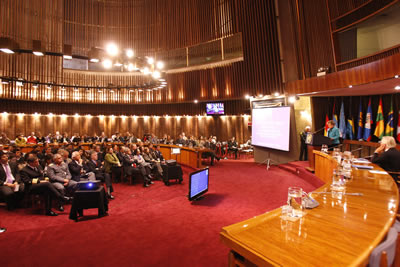"Innovation Is Essential for Increasing Productivity and Improving Competitiveness in Countries"
Astori gave the Eleventh Raúl Prebisch Memorial Series Lecture at the organization's headquarters in Santiago, Chile.

(26 April 2012) Innovation is a key element for increasing productivity in the economies and improving competitiveness among the countries of Latin America and the Caribbean, said the Vice-President of Uruguay Danilo Astori at ECLAC when giving the Eleventh Raúl Prebisch Memorial Lecture Series.
Astori gave a master lecture at the UN organization's headquarters in Santiago, Chile, entitled The challenges of innovation and productivity in a national economic and social development project, before an audience constituted by local authorities, ambassadors, scholars, international officials and Civil Society members.
He was received by Alicia Bárcena, Executive Secretary of ECLAC, who highlighted the Uruguayan Vice-President's qualities and his broad experience on the development of a Latin American economic thinking as part of the Raúl Prebisch tradition, former Executive Secretary of ECLAC, in whose memory this lecture series is organized.
Bárcena remembered Prebisch's aphorism, as valid today as in the past: "before thinking, observe reality."
"Today, as back in his times, the Latin American countries continue facing major structural inequality, as well as problems related to productive diversification, an insufficient rhythm of technological change and a limited innovation capacity. Today, as back then, the region is witnessing a boom in raw material exports with institutional deficiencies which hinder a true vision of State on property, ownership and distribution of productivity gains and the income deriving from the exploitation of these resources," declared the Executive Secretary of ECLAC.
Prebisch claimed it was urgent to change the accumulation and concentration logic related to the means of production and wealth. "Today, however, this paradigm has changed. It is not only about growing to become equal; it is fundamental to become equal in order to grow," said Bárcena.
"Today, as in Prebisch's times, the urge to articulate a deep regional integration is still current, which was one of the central strategic objectives among his ideas and which has now been achieved through initiatives such as the Union of South American Nations (UNASUR) and the Community of Latin American and Caribbean States (CELAC)," she continued.
"Danilo Astori is a universal Uruguayan. Only a few of those who resemble him in thinking and practice would be suitable for taking up the Prebisch tradition, as he has a multifaceted path, a solid set of ideas and an unbreakable commitment to use them in the transforming creation of fairer societies," added Bárcena.
In his presentation, the Vice- President of Uruguay elaborated on the features that a national economic and social project must have and how the concepts of innovation and competitiveness influence public policy making.
He stressed the importance of having a long-term strategic vision, which has not always existed in Latin America. "In the last years, Latin America has significantly reduced poverty and indigence; yet, it is still the least unequal region in the world," he noted.
"Talking about economic and social development must involve all these concepts but at a same hierarchical level. Public policies aiming to improve people's life quality can not be a sub-product of economic policy but one of its conditions," emphasized Astori.
The Vice-President expressed that in a national development project, education, scientific knowledge and culture play a fundamental role. On education and scientific and technological expertise, Astori underlined the State's key role in the creation of alliances with the private sector and the task of ensuring the availability of human and financial resources. "Knowledge translates to a higher added value of products in the various economic sectors," he explained.
After showing the differences between the two approaches generally used for analyzing productivity and competitiveness - traditional or static, and modern or dynamic - Astori highlighted that improving productivity should not be an end in itself and that the population's wellbeing is achieved through productivity, an increase in production and income distribution, as well as through a series of public policy actions.
"What we want to build is equality of rights and opportunities in a context of freedom, democracy, justice and prosperity," he said.
Astori mentioned that there are several factors that determine the increase of productivity, such as State-driven public policies - related to macroeconomic stability, institutional quality and investment incentives, among other aspects - and actions carried out by enterprises (microeconomic engines).
"Innovation and competitiveness are two fundamental processes that will allow Latin America to face its future in sustainability, with a strategic vision and a national economic and social development programme. In other words, to face the future in hope - a hope the region has the right to bear - based on its internal potential," concluded Astori.
See also:
- Words by Alicia Bárcena, ECLAC Executive Secretary (in Spanish)
- Presentation by Danilo Astori, Vice-President of Uruguay (in Spanish)
For further questions, please contact ECLAC's Public Information and Web Services Unit: dpisantiago@cepal.org ; Tel.: (56 2) 210 2040.
Country(ies)
- Latin America and the Caribbean
-
Uruguay
Contact
Public Information Unit
- prensa@cepal.org
- (56 2) 2210 2040